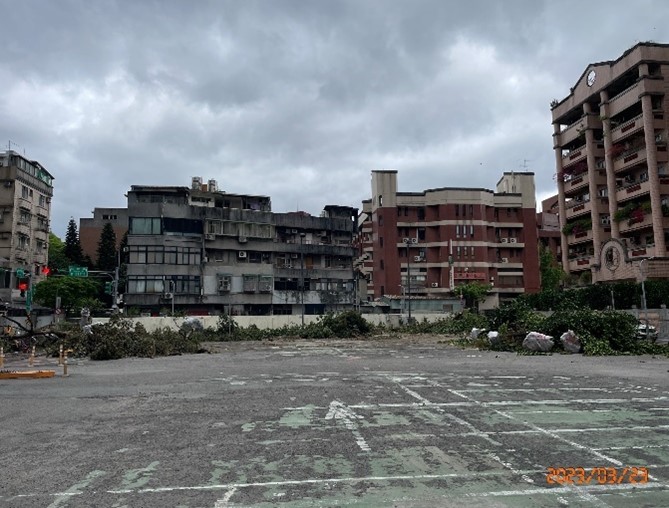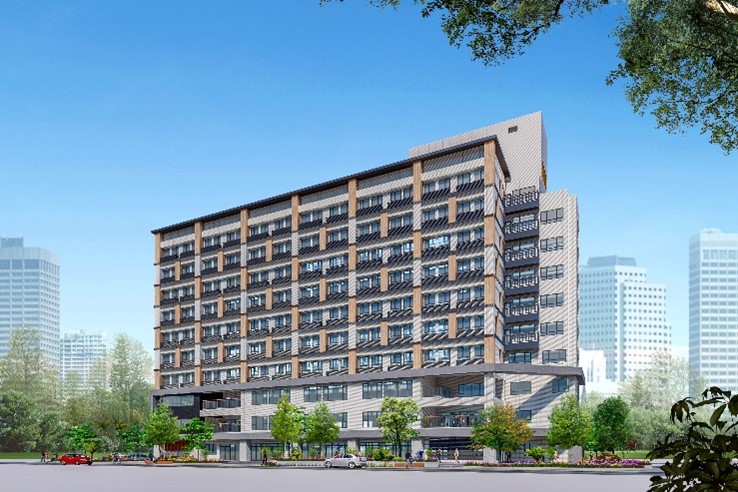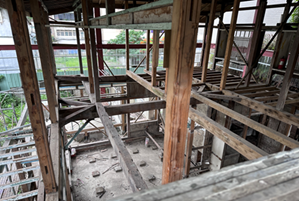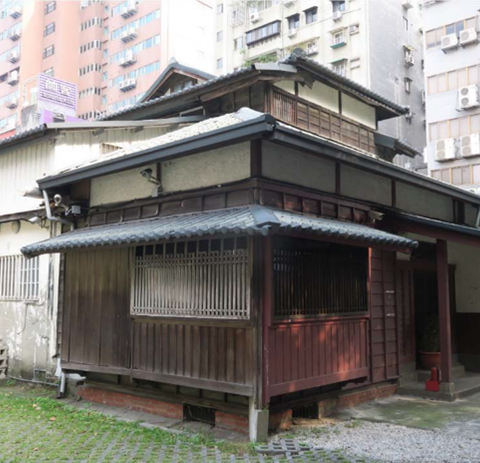2024 SDG 11 English
- 11.2.1 Public Access to Buildings
- 11.2.2 Library Access
- 11.2.3 Opening Art Venues to the Public
- 11.2.4 Public Access to Green Spaces
- 11.2.5 Contributions to Art and Heritage
- 11.2.6 Promoting the Inheritance and Development of National Languages
- 11.4.1 Setting Sustainable Commuting Goals
- 11.4.2 Specific Measures to Promote Sustainable Commuting
- 11.4.3 Allowing Remote Work
- 11.4.4 Provision of Employee Accommodation
- 11.4.5 Provision of Student Accommodation
- 11.4.6 Pedestrian Priority on Campus
- 11.4.7 Collaboration with Local Authorities
- 11.4.8 New Building Standards
- 11.4.9 Brownfield Redevelopment
11.2.1 Public Access to Buildings
The NTNU boasts a rich history, established initially as the Taipei High School campus during the Japanese colonial period. Several historical buildings, including the Puzu Building, Wenhui Hall, the Auditorium, and the Administration Building, were completed between 1926 and 1929 and are now designated as Taipei City historic sites. These buildings are also protected under the Cultural Heritage Preservation Act. To allow the general public to enjoy the open spaces of the campus, the university is fully open to the public, allowing free access for visitors. Guided campus tours are also available upon request. Additionally, guided tours of the campus can be arranged upon request. In 2023, 39 tours were conducted, with 607 participants.
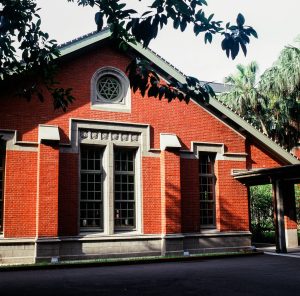
“Yunhe Street No. 11” (now known as the Liang Shih-Chiu Residence), built in 1933, originally served as dormitories for the Taipei High School. It later became the official residence of renowned literary figure Liang Shih-Chiu upon his return to Taiwan, imbuing it with significant historical and cultural value. After extensive research into its history, the university undertook restoration efforts to preserve the original building materials and highlight the beauty of traditional Japanese architecture. The residence was officially registered as a historic building by the Taipei City Government in 2004 and opened to the public in 2014. The residence also offers the service of replicating, photographing, and exhibiting the university’s historical artifacts. In 2023, it welcomed 2,206 visitors.
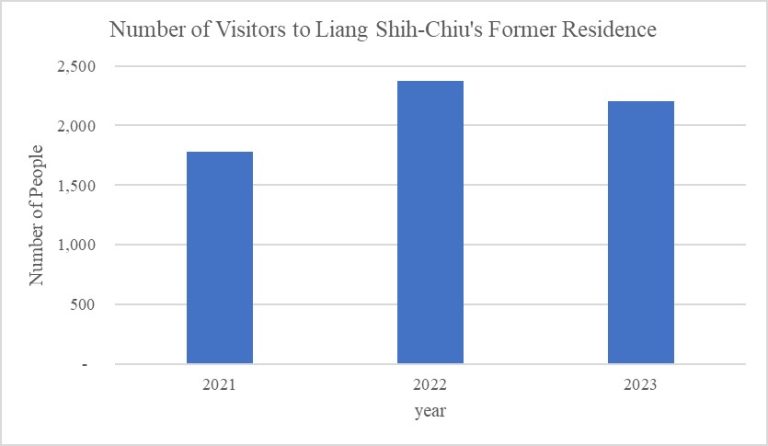
11.2.2 Library Access
By 2023, the library of our school has a total collection had reached 4,583,687 items, with 585,443 visits recorded. The library is open to the general public for free visits and reading.
In addition to general reading rooms and self-study areas, the libraries house an exhibition hall dedicated to the university history, group discussion rooms, research rooms, multipurpose rooms, audio-visual booths, art exhibition walls, and leisure and fitness areas.The libraries are open year-round except for certain national holidays and designated school breaks. While they primarily serve university faculty, staff, and students, the libraries are also accessible to the general public. They can enter for free and use the reading facilities according to specific guidelines. The library collection is diverse, and in recent years, e-books have steadily increased alongside physical books to enhance accessibility and circulation.
Our school follows the example of the Massachusetts Institute of Technology’s OpenCourseWare (NTNU OCW) and adheres to the principles of open learning. Most of our professional and general education courses, as well as guest lectures from outside speakers, are open for free viewing! The library is dedicated to the establishment of various digital resources, including databases, electronic journals, and e-books needed for research and teaching. It also focuses on institutional archiving of our school’s publications and faculty works, as well as the digital preservation of special library collections, such as the digitization of rare ancient books, making it convenient for readers to freely search online.

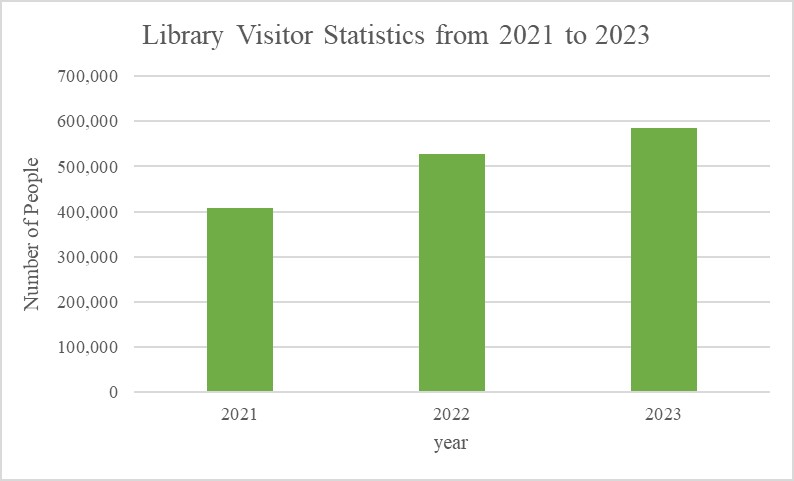
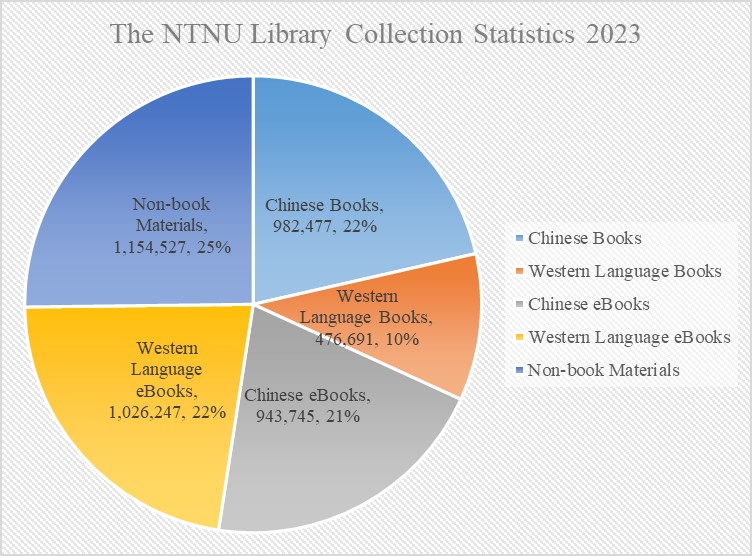
11.2.3 Opening Art Venues to the Public
Come and make fun memories at the 2023 Arts Festival by the NTNU College of Arts!
The NTNU is the oldest higher education institution for fine arts in Taiwan. Over the years, many renowned masters have taught here, bearing witness to the evolution of modern Taiwanese art and culture. The university has been pivotal in fostering Taiwan’s art development and nurturing its top talents. The campus houses various art exhibition venues, including the NTNU Art Museum, Dequn Gallery, Taiwan Design Center, International Printmaking Center, Cultural Preservation Center, the Main Complex, and the Library, all open for art exhibitions. In 2023, a total of at least 134 public exhibitions were held. Among these, the NTNU Art Museum, which had been in the planning, design, and construction phases for several years, was fully opened to the public in 2023. The museum holds a collection of over 4,000 artworks and is a valuable resource for teaching art and culture and fostering innovation. Additionally, the Division of Continuing Education provides an “Online Gallery” featuring various works in various media, such as sketches, watercolors, oil paintings, and prints, allowing the public to access and appreciate these precious artworks from anywhere easily.
The Life Science Museum was established in 2022, offering free admission and the option to apply for guided tours.
College of art school holds a public and free art festival every year, and the theme for 2023 is “Campus Art Light Travel Imprint.”
List of 2023 Art Exhibitions at Our University
展出單位 | 展期 | 展覽名稱 |
師大美術館 | 2023/1/31-2/5 | 銀光-師大美術館典藏圖卡(於台北國際書展展出) |
2023/9/16-11/4 | 百年再啟:2023年台灣美術院院士大展 | |
2023/9/23-11/4 | 轉藝 一樓光影走廊 | |
2023/9/16-11/4 | 開放修復展 | |
2023/9/16-11/4 | 典藏精選展 | |
2023/12/2-2024/2/3 | 分身術─身體意象的敘事與寓言 | |
2023/12/12-16 | 浮島世代—台港當代水墨交流展 | |
師大圖書館一樓藝文展牆 | 2023/02/20-25 | 林佳麗環保繪本創作展 |
2023/03/27-31 | 微觀.內灣老街(呂宇雯) | |
2023/04/13-17 | 遇見完形的內心:近攝攝影結合ASMR音頻之實驗影像創作 | |
2023/04/20-25 | 馮煒棠設計展 | |
2023/05/03-09 | 「優子與俊介」李文閣繪本創作展 | |
2023/05/10-17 | 賴子晴設計個展 | |
2023/05/18-6/2 | 高行健週特展 | |
2023/06/19-21 | 柯梓偉—主題海報畢業展覽 | |
2023/07/17-24 | 黃偉如創作個展 | |
2023/07/26-08/04 | 《被遺棄的___》高竹瑩字墨創作展 | |
2023/08/07-11 | 林瑞瑛個展 | |
2023/09/12-19 | 《日常・插畫》洪依綸創作個展 | |
2023/10/12-20 | 羅凡晸老師/書法人生三部曲 | |
2023/10/23-31 | 王心穎創作個展 | |
2023/11/06-10 | 徐政達創作個展 | |
2023/11/13-17 | 蕭若盈創作個展 | |
2023/12/12-14 | 陶藝作品的商業攝影表現 | |
2023/12/15-25 | 陳怡雯創作個展 | |
2023/12/26-2024/01/02 | 詹喬雅設計個展 | |
師大德群畫廊 | 2022/12/31-2023/1/5 | 與版共舞:臺灣·韓國現代木版畫交流展 |
2023/1/7-1/12 | 幽禁的靈魂-鄒佳哲創作個展 | |
2023/1/7-1/11 | 浦城街,復華街-陳宇丞創作個展 | |
2023/1/14-1/19 | 臨界.距離-吳貞霖、林玫筠繪畫雙人展 | |
2023/2/4-2/15 | 靈魂的渡口-吳寬墩戴瀚成創作聯展 | |
2023/2/4-2/9 | 失序水域-黃昱潔 戴語萱 雙人聯展 | |
2023/2/18-2/23 | 台灣現代藝術家協會2023聯展 | |
2023/2/18-2/23 | 非空非有-夏淑慈彩墨創作個展 | |
2023/2/25-3/02 | UNREAL-陳映蓉創作個展 | |
2023/3/4-3/09 | 交織・語彙—劉立堅繪畫創作個展 | |
2023/3/4-3/09 | 疫情·控-彭志成水墨創作個展 | |
2023/3/18-3/23 | 戲說情愛-秦秀珠 水墨京劇創作 | |
2023/3/25-3/30 | 遇・不完美生命─吳宗翰 油畫創作展 | |
2023/4/8-4/13 | 變異社會—寄生與共生─曾新瑩繪畫創作個展 | |
2023/4/15-4/20 | 家庭故事-許哲維創作個展 | |
2023/4/22-4/27 | 寂。靜。陳怡伶畢業創作展 | |
2023/4/29-5/4 | 憶像中的異像-林道銘油畫創作展 | |
2023/5/13-5/18 | 寫書書寫 空間語境探索-周季蓉創作個展 | |
2023/5/20-5/25 | 花影.意境-潘文瑛創作個展 | |
2023/5/27-6/01 | 生命弦音 穿越畫筆心-林育州個展 | |
2023/6/03-6/08 | 空間轉換·蕨語-鍾夙芬繪畫創作探析 | |
2023/6/10-6/15 | 自然的療癒之旅—詹琬茹創作個展 | |
2023/6/17-6/22 | 變換的視野-黃于亭創作個展 | |
2023/6/24-6/29 | 慢性‧異變-黃育婷創作個展 | |
2023/7/08-7/13 | 無聲的騷亂──曾瓊瑩畢業創作個展 | |
2023/7/22-7/27 | 幻遊.彼岸-青衿之志林麗玲彩墨創作展 | |
2023/9/9-9/14 | 微心流-藝術繪舍2023聯展 | |
2023/9/9-9/14 | 黃俊騰創作個展 | |
2023/9/16-9/21 | 吾用無用-盧縉梅創作個展 | |
2023/9/16-9/21 | 毓-林義鈞 朱盈儒創作展 | |
2023/9/16-9/21 | 謝家容創作個展 | |
2023/9/23-9/28 | 百年風華 大稻埕的追憶-楊美女創作展 | |
2023/9/23-9/27 | 一一_暫時的現實─葉育男個展 | |
2023/9/23-9/28 | 漸亮的窗口-林明彥 錢思璞創作聯展 | |
2023/9/23-9/28 | 郭芷毓創作個展 | |
2023/9/30-10/5 | 林秋菊紀念展暨師大美研所在職班創作組105及聯展 | |
2023/10/14-10/19 | 大河詠歌-鍾樹人繪畫創作個展 | |
2023/10/14-10/19 | 「動.流變」——劉憶青彩墨創作展 | |
2023/10/21-10/26 | 72風華40重聚美展 | |
2023/10/28-11/2 | 2023藝論 | |
2023/10/28-11/2 | 愛、時間與記憶-高以樂創作個展 | |
2023/11/4-11/16 | 陳景容 許維斌聯展 | |
2023/11/4-11/9 | 非空非有-夏淑慈畢業個展 | |
2023/11/11-11/16 | 現代繪畫之創作語彙成果展 | |
2023/11/18-11/23 | 「你不知道的科技霸權」──張翊峰水墨創作展 | |
2023/11/18-11/23 | 探—心靈意象|吳美華創作個展 | |
2023/11/18-11/23 | 從徒勞中出走——張懿人創作個展 | |
2023/11/25-11/30 | 第五屆德鄰師大獎助計畫成果展 | |
2023/11/25-11/30 | 慾望塵世花敘言-陳幽利個展 | |
2023/11/25-11/30 | 微型中的浩瀚—李怡璇創作個展 | |
2023/12/2-12/14 | 第74屆系展 | |
2023/12/2-12/7 | 素描媒材與形式探索 | |
2023/12/9-12/14 | 家居幽光-劉安婕個展 | |
2023/12/16-12/21 | 2023微藝博 | |
2023/12/22-12/28 | 獨奏之海-林酉融創作個展 | |
2023/12/23-12/28 | 王婷 閨密創作個展 | |
2023/12/30-2024/1/4 | 測不準:莊大緯個展 | |
師大國際版畫中心 | 2022/12/31-2023/1/5 | 與版共舞:臺灣 • 韓國現代木版畫交流展 |
2023/1/3-2/17 | 權惠貞版畫創作個展 | |
2023/3/5-3/28 | 複數·重組-版畫in 當代 (於國父紀念館德明畫廊舉辦) | |
2023/3/16-3/29 | 版印無垠 : 臺灣·韓國當代版畫交流展(於國父紀念館博愛藝廊合辦) | |
2023/3/15-3/28 | 複數•重組-版畫in當代 | |
2023/4/1-4/16 | 2023 台日美術交流展 (於國父紀念館合辦) | |
2023/5/4-5/25 | 2023日本版畫名家邀請展 | |
2023/5/29-6/30 | 句.憶–姚梧林創作個展 | |
2023/5/29-6/30 | 有時、有刻:版16木刻畫會(於李科永紀念圖書館展出) | |
2023/8/1-8/31 | 發現喜悅–沈金源版畫個展 | |
2023/9/15-9/19 | 韓國現代版畫家協會2023 年台韓交流展(於韓國誠信女子大學GAON展廳展出) | |
2023/9/18-10/12 | 2023米壽紀念—廖修平及筑波學生展 | |
2023/10/18-11/10 | IPC平版畫工作坊成果展 | |
2023/11/13-11/24 | 林福全版畫創作個展 | |
師大藝術學院 | 2023/3/31-5/31 | 「空間演繹」當代水墨多媒材裝置展暨論壇(於淡江大學文錙藝術中心舉辦) |
2023/3/8-4/23 | 傳統與現代的辯證—2023莊連東彩墨創作面向展(於臺中市港區藝術中心展出) | |
2023/5/31-6/13 | 美術系112級畢業展(於國父紀念館文華軒展出) | |
2023/6/2-6/5 | 設計學系畢業展覽〈MorE 查看更多__〉(於台北松山文創園區展出) | |
2023/8/12-8/27 | 水彩藝術─臺灣水彩畫協會會員暨師大美術系師生聯展(於國父紀念館博愛藝廊展出) | |
師大臺灣設計口-西口 | 2023/1/1-12/31 | 常設展,不定期更換展品 |
師大臺灣設計口-東口 | 2023/5/15-5/17 | 臺日設計交流展 |
2023/1/9-1/13 | 蕭巧茹創作展 | |
2023/2/13-2/17 | 詹喬雅、徐彗瑋創作展 | |
2023/2/27-3/3 | 曲璽齡、林妍蓁創作展 | |
2023/3/6-3/10 | 柯梓偉、黃曼林創作展 | |
2023/3/13-3/17 | 黃家畇、施京汝創作展 | |
2023/3/20-3/24 | 《Social Message 社會設計》-國際學生海報交流展 | |
2023/3/27-3/31 | 蕭若盈、徐政達創作展 | |
2023/4/3-4/7 | 林采嫺創作展 | |
2023/4/10-4/14 | 李冬淳、向祖民、蔡志軍創作展 | |
2023/4/17-4/28 | 2023DD AWARD設計學系系展 | |
2023/5/10-5/17 | 《連結》野老朝雄工作坊成果展 | |
2023/5/22-5/26 | 陳婷妤創作展 | |
2023/5/27-6/2 | 設計系學士班設計素描展 | |
2023/6/5-6/9 | 陳詠薇、蘇霈芯創作展 | |
2023/6/12-6/16 | 林倞宇創作展 | |
2023/6/19-6/30 | 設計學系碩士在職專班畢業展 | |
2023/7/03-7/7 | 呂宇雯創作展 | |
2023/7/10-7/14 | 張若筠、郭家佑創作展 | |
2023/8/7-8/11 | 謝宇昕創作展 | |
2023/9/5-9/27 | 〈日本平面設計的前後左右〉特展 | |
2023/10/18-10/20 | 國際比賽的符號學和視覺傳播工作坊成果展 | |
2023/10/23-10/27 | 林昕怡創作展 | |
2023/10/30-11/3 | 林采嫺創作展 | |
2023/11/13-11/17 | 2023臺師大X富邦人壽「失智關懷協尋手鍊優化產學案」成果展 | |
2023/11/27-12/1 | 梁書寧、潘柏寬、于千涵、石晴文創作展 | |
2023/12/4-12/8 | 設計系學士班116級班展 | |
2023/12/11-12/15 | 設計系學士班115級班展 | |
2023/12/18-12/22 | 設計系學士班114級班展 | |
2023/12/25-12/29 | 設計系學士班113級畢業展預展 | |
師大進修推廣學院一樓大廳藝廊 | 2023/6/2-7/4 | 美術系王瓊麗教授師生聯展 |
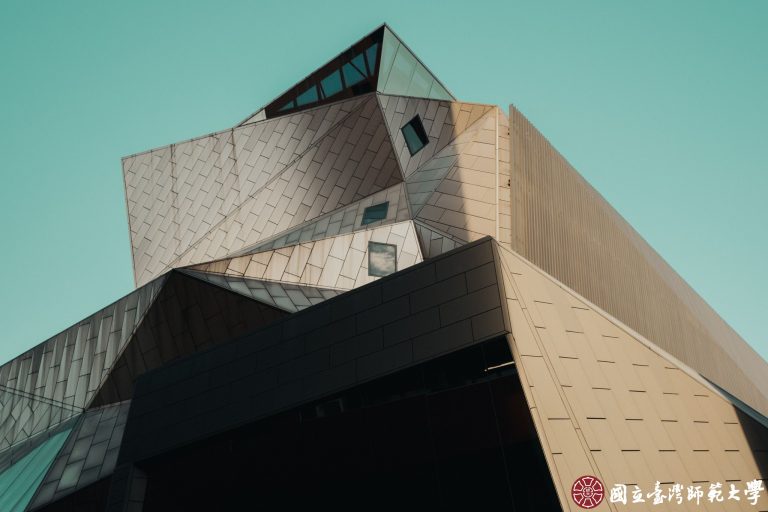
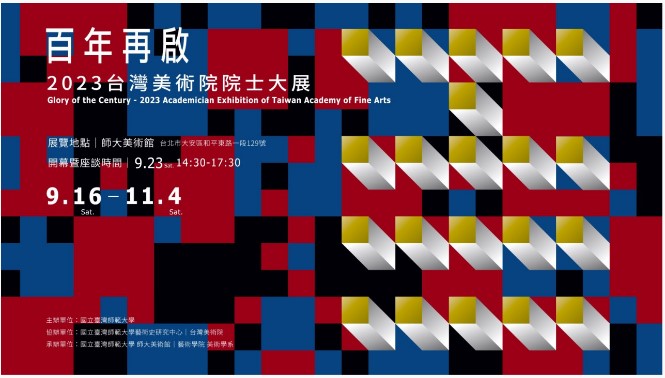
11.2.4 Public Access to Green Spaces
Research indicates that parks and green spaces have self-purifying abilities, which not only help reduce air pollution, noise, and the heat island effect but contribute to a sense of well-being. The university’s sports fields, gardens, lawns, ponds, and artificial wetlands serve functions similar to public parks. Located in the city’s heart, our university is an open campus. Besides prohibiting motor vehicles, in recent years, we have also allowed pet owners to bring their pets onto campus and implemented the “Sports Facilities Open Access Management Guidelines” to ensure the campus remains a safe and welcoming space. Residents can freely enter the campus to enjoy the green spaces, use the sports and recreational facilities, and access drinking fountains and restrooms. During early mornings and evenings, it’s common to see community groups engaged in activities like dance, martial arts, and yoga in the open spaces, promoting public health and fitness initiatives for all.
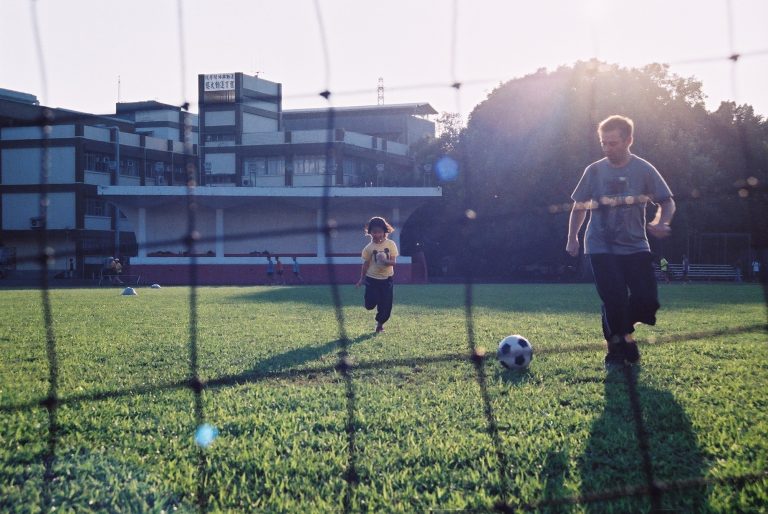
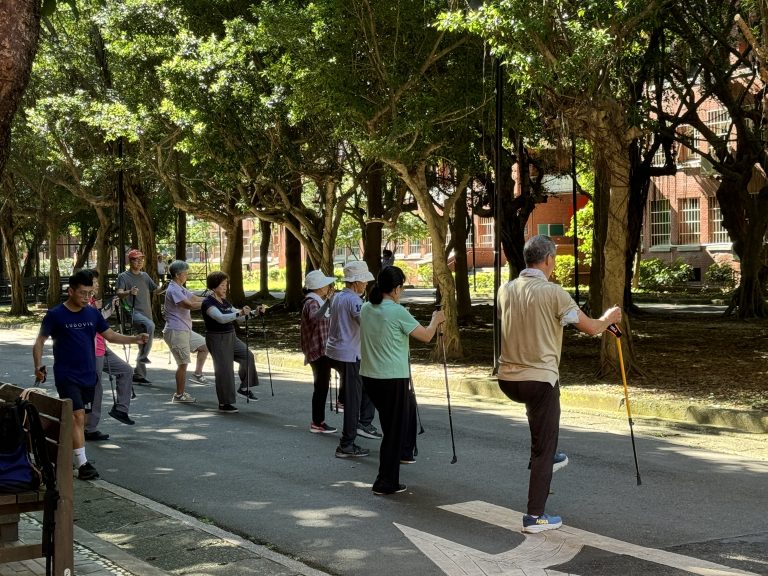
The university’s open campus provides a friendly space for community residents to engage in physical activities.
11.2.5 Arts and heritage contribution
1.The College of Arts at our school holds the National Taiwan Normal University Arts Festival every March, inviting the community to participate for free. The event features a variety of activities, including markets, painting, installation art, and handmade workshops. Additionally, there are public international exchange exhibitions, seminars, master lectures, and performance events. In 2023, there will be at least over 100 art and fine arts exhibition activities.
2.The Department of Music has a history spanning over 70 years. Over time, the Institute of Ethnomusicology and the Graduate Institute of Performing Arts were established, followed by the founding of the College of Music in 2007. In addition to these programs, the university also offers a Bachelor’s Program in Performing Arts, a Digital Audio-Visual Arts program, the Music Digital Archive Center, and the Asian Pop Music Digital Technology Research Center. The college has long been recognized as a leading institution in Taiwan’s education system and a model for nurturing outstanding talent in the arts and culture.
There are various performance venues on campus, including the Historic Music Hall, the Department of Music Concert Hall, the Oluse Hall at the Institute of Ethnomusicology, and the intimate Zhiyin Theater. These spaces host regular and memorable performances, ranging from music to vocal and theatrical events, enriching the campus culture and offering the community and general public opportunities for aesthetic experiences that enhance their artistic lives. For instance, the “2023 NTNU Music Festival,” now in its 15th year, ran for five months and featured over 30 performances, including symphonic concerts, solo instrumental recitals, opera productions, dance theater, and choral performances. The university’s student choir, the “NTNU Choir,” is a highly active group within Taiwan’s choral community, regularly organizing central public performances and charity tours each academic year. Additionally, the Graduate Institute of Performing Arts adapted Gao Xingjian’s cinematic poem “Requiem for Beauty” into a dance theater production, capturing the poem’s essence and paying tribute to the Nobel Prize-winning literary master.
In total, the university held at least 90 performances in 2023. A detailed list of these events is as follows:
List of 2023 Public Art Performances at NTNU
活動日期 | 活動名稱 | 場次 |
2023/1/8 | 《心之所響》師大合唱團2023冬季音樂會 | 1 |
2023/3/22-6/8 | 音樂學院2023師大音樂節系列活動 | 33 |
2023/3/30-11/30 | 音樂學院未來大師培育計畫相關活動 | 20 |
2023/4/17 | 民音所公演《絃管與北管》 | 1 |
2023/5/5/-5/7 | 表演所第18屆學期製作-原創音樂劇《還在路上》 | 4 |
2023/5/8 | 音樂系管弦樂團公演 | 1 |
2023/5/13、6/10 | 音樂系混聲合唱《2023春—傳藝新頌·師大風華》 | 2 |
2023/5/30 | 管樂隊公演 | 1 |
2023/6/19 | 音樂系管弦樂團與表演藝術研究所《美的葬禮》 | 1 |
2023/7/5 | 《夜幕尋心》師大合唱團2023年度音樂會 | 1 |
2023/7/6-7/9 | 師大合唱團暑期大型公演暨公益巡迴演出 | 3 |
2023/7/30 | 三校聯合(師大、台大、台科大)管樂隊公演 | 1 |
2023/8/14-8/18 | 表演所赴英國愛丁堡藝穗節演出《山海經傳》 | 9 |
2023/9/20-9/24 | 管樂隊赴日本北海道教育大學進行交流及演出 | 2 |
2023/11/10 | 管樂隊校運會開幕表演 | 1 |
2023/11/11 | 管樂隊校運會閉幕表演 | 1 |
2023/11/17 | 管樂隊與首爾長笛獨奏家樂團交流演出 | 1 |
2023/11/28 | 音樂系管弦樂團公演 | 1 |
2023/12/12-12/14 | 表演所演出《樂戰13》 | 3 |
2023/12/17 | 管樂隊與北海道教育大學管樂團聯合音樂會 | 1 |
2023/12/22-12/24 | 表演藝術學士學位學程演出《校園生存守則》 | 4 |
2023/12/25 | 管樂隊2023公館音樂祭 | 1 |
2023/12/29 | 師大合唱團聲樂發表會 | 1 |
2023/12/30 | 管樂隊嘉義管樂節室內音樂會 | 1 |
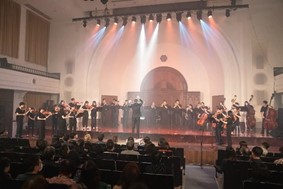
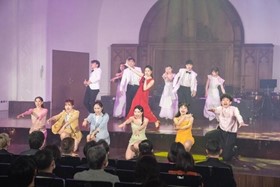
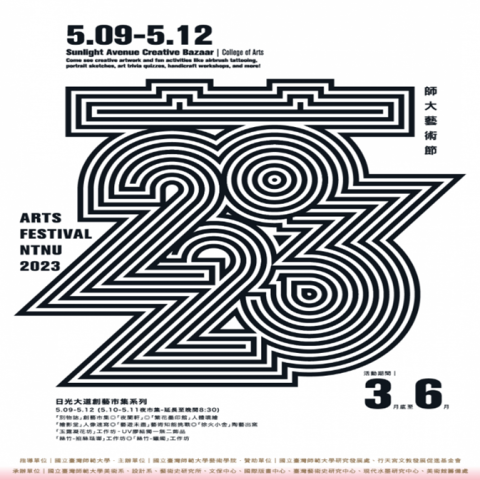
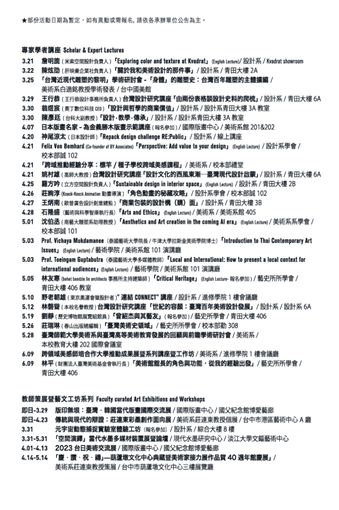
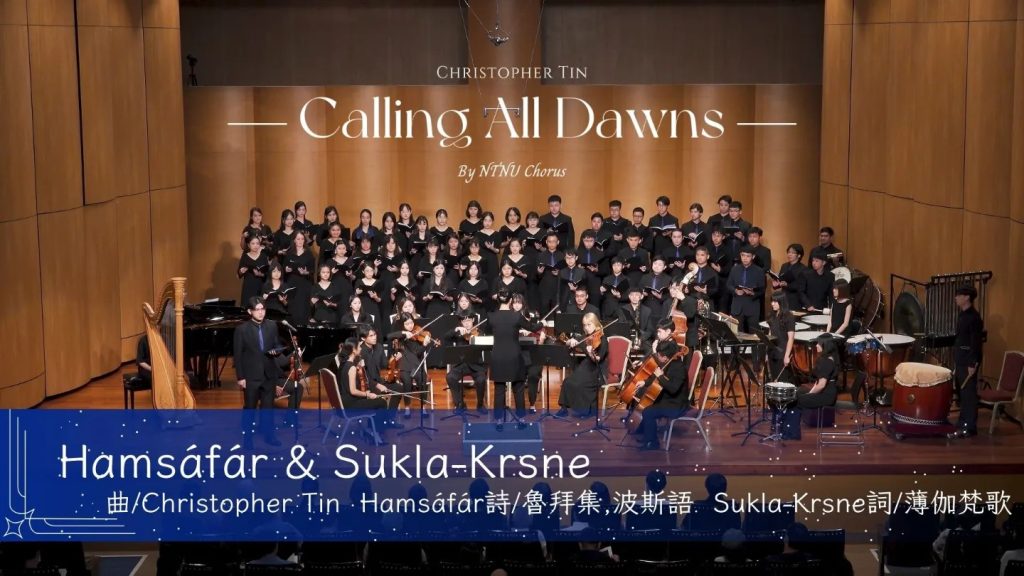
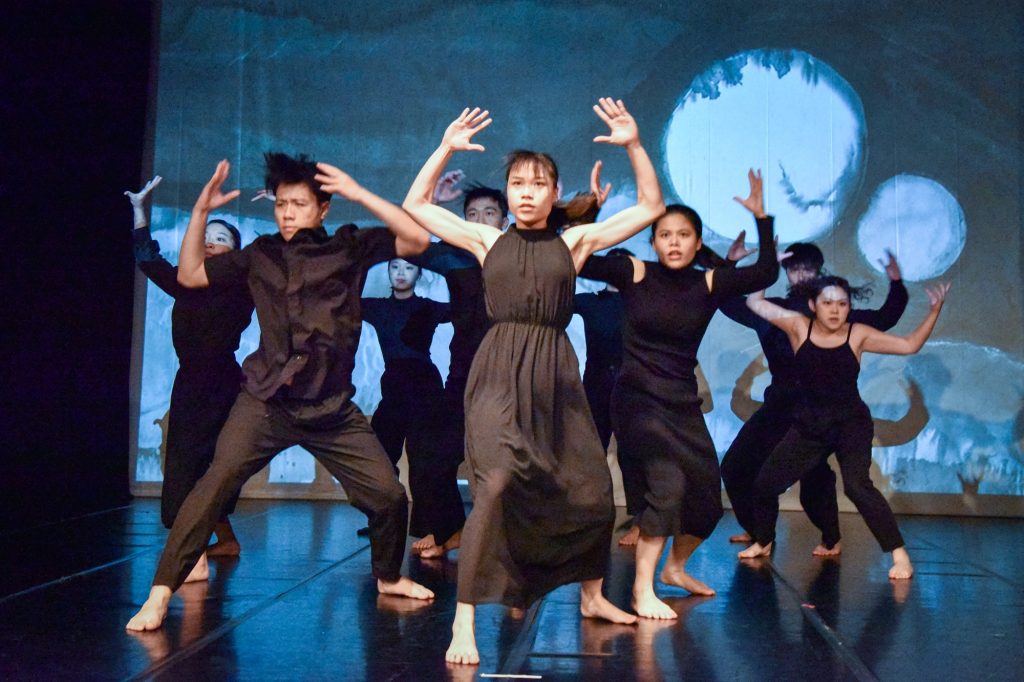
11.2.6 Promoting the Inheritance and Development of National Languages
1.The Institute of Ethnomusicology has long focused on Indigenous music, music iconography, and music documentaries and actively preserved essential aspects of Indigenous music, language, and culture by recording, filming, and authoring books on traditional music and songs. It has also unearthed many ancient songs that have been rarely sung or have long been dormant, contributing significantly to preserving intangible cultural heritage. Recent related research projects include: the Reproduction and Transmission of Indigenous Traditional Music (2023), the Revitalization Project of Yami (Tao) Traditional Music (2022), the Reproduction of Indigenous Sounds from the 1960s Publication Project (2022), the Conservation Project of the Important Traditional Performing Arts – the Amis Tribe Malan Macacadaay (2021), the Yami (Tao) Music Survey Project in Hongtou Village, Lanyu Township, Taitung (2018), and the Saisiyat Music Survey Project in Penglai Village, Nanzhuang Township, Miaoli County (2018). In addition, the university has established the “Indigenous Research and Development Center” and the “Indigenous Education and Culture Credit Program,” offering various courses and training on Indigenous knowledge and skills. Through teacher development, the university aims to gradually enhance the professional expertise of Indigenous educators, strengthen their language abilities and professional knowledge to pass on Indigenous wisdom, nurture diverse Indigenous talents, and promote the development of Indigenous peoples.
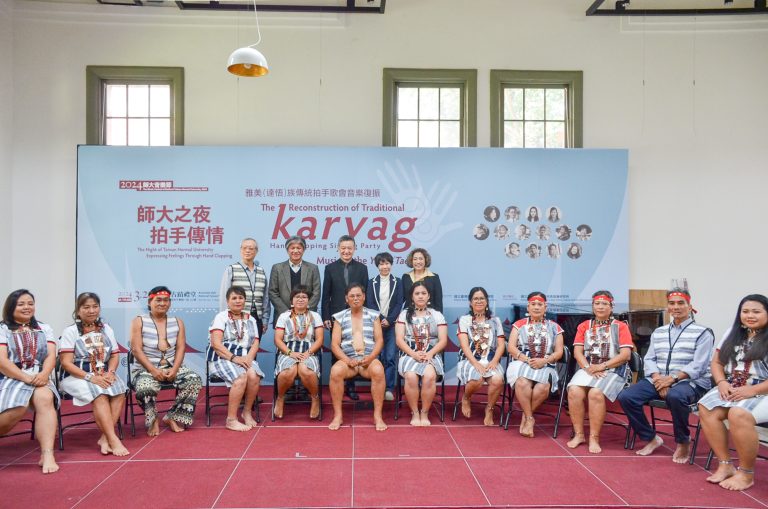
2.The “Global-Local Approach to Kinmen’s Local Revitalization and Youth Empowerment Program” aims to rebuild social resilience and explore new directions for local development. It guides students to engage with both the theoretical and practical aspects of the “global-local” perspective while enhancing the quality of cultural governance in Kinmen. Through systematic interviews and collecting oral histories from Kinmen elders, the program organizes workshops, walking tours, and lectures to promote and preserve these stories. Additionally, in collaboration with the “Kinmen Historical and Folk Museum,” the program has launched a multilingual display project for the museum’s main gallery, completing the planning and recording of multilingual audio guides, ensuring that Kinmen’s unique culture is passed down through generations.
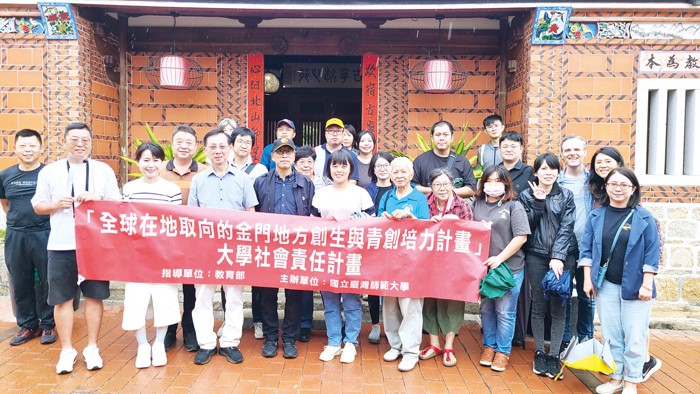
3.The university has established a specialized collection and research center to document and preserve intangible cultural heritage through various projects. The collections include approximately 4,010 entries in the “Rare Books Digital Archive,” 185,171 entries in the “Mahua Literature Database,” 1,353 entries in the “Digital Archive of Liang Shih-chiu’s Documents,” and about 2,892 entries in the “Gao Xingjian Archive,” all of which can be accessed through the library’s Special Collections section on the university website. Additionally, the “Asian Studies Special Collection” focuses on preserving Asian culture, art, and ethnology, covering topics such as art, literature, fiction, folklore, customs, rituals, philosophy, mythology, opera, paper-cutting, and urban-rural studies. It also includes dictionaries of languages from various Asian countries or ethnic minorities, providing invaluable resources for research and teaching in cultural and art sociology.
4.The “Music Digital Archive Center,” established in 2010, is the first institution in Taiwan dedicated to music archiving. To date, it has completed over 30 projects to preserve Taiwan’s precious musical documents, including 15 large-scale national digital archiving technology projects, preserving nearly 200,000 digital records with outstanding results. In 2023, the center acquired 56 rare reel-to-reel tapes and one 8mm silent film reel. In December, the center launched the “2023 Precious Recordings Online Exhibition: Memory • Palau,” highlighting the importance of preserving and showcasing musical and audiovisual documents. Additionally, the center regularly hosts forums, lectures, workshops, and seminars. It presents project results at the International Association of Music Libraries, Archives, and Documentation Centres, expanding international exchange and global impact.
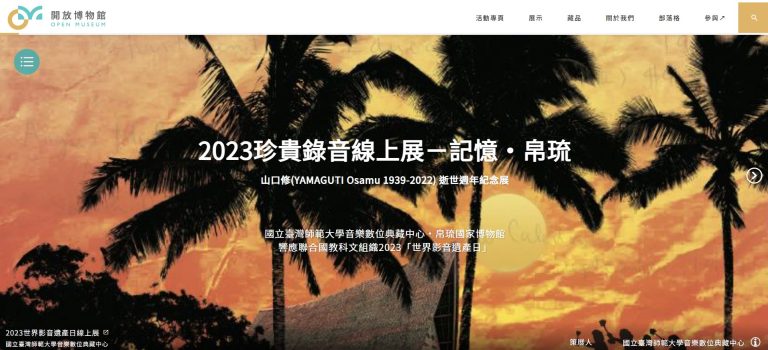
5.The university established the “Cultural Heritage Preservation and Conservation Research Center” in 2011, specializing in inspecting, diagnosing, and conservating damaged paintings and various cultural artifacts. It is the first national university in Taiwan to set up a restoration center. In collaboration with the university’s art museum, the center has inspected and restored over 4,000 pieces from its collection annually. It is also the top choice for artifact restoration by major museums and private collectors in Taiwan. The center has restored priceless works, including masterpieces by Picasso and Renoir valued at over a hundred million NT dollars, the Juyan Han Slips, and significant historical manuscripts and national treasures from government institutions. In 2023 alone, the center restored 417 historically valuable artworks, including sketches, oil paintings, watercolors, and bronze sculptures.
11.4.1 Setting Sustainable Commuting Goals
The university is in a metropolitan center with a well-developed public transportation system. The sidewalks surrounding the campus are designed to be between 1.5 and 4 meters wide, providing a safe and convenient walking space for faculty and students. To actively reduce carbon emissions from transportation, the university encourages using low-carbon commuting methods such as walking, public transit, bicycles, or electric vehicles. Additionally, we are collaborating with municipal authorities and relevant businesses to implement the following initiatives as part of campus operations:
1.Convenient Public Transportation
The university offers free shuttle buses and the number of public shuttle buses in the campus continues to increase, with a total of 3,492 vehicles in 2023, up from 2,908 in 2022, representing a 20% increase in service capacity.
2.Promoting Low-Carbon Transportation
- University Pathway Commuting Project: By planning bicycle commuting routes, students attending inter-university courses within the Taiwan University System or commuting between campuses will have safer and more convenient road options, increasing the use of bicycles for commuting.
- YouBike Rental System: As of 2023, the number of bike stations has increased to 329, and in the future, YouBike rental stations will continue to be added around the campus.
- Electric Scooter Battery Swap Stations: In collaboration with vendors, the university has installed Gogoro electric scooter battery swap stations on campus to facilitate commuting for faculty and students using electric vehicles.
- Acquisition of Low-Carbon Vehicles: Our school has fully procured 100% low-carbon electric vehicles for transportation.
3.Increase Dormitory Capacity to Reduce Commuting
To reduce pollution from commuting, the university has been continuously renovating and rebuilding dormitories in recent years to provide more quality accommodation for students, which is expected to reduce the number of commuters by 50% over the next three years.
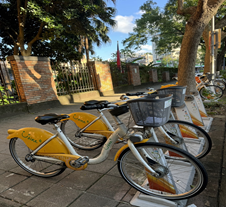
11.4.2 Specific Measures to Promote Sustainable Commuting
1.Increasing Dormitory Capacity to Reduce Commuter Numbers
In recent years, the NTNU has been actively renovating and rebuilding dormitories. Following the completion of the second student dormitory in 2022, which added 3,000 beds, there are now over 5,800 beds available to meet student accommodation needs. In 2023, the university began the construction of the International Student Dormitory, which is expected to be completed by 2027 and will provide an additional 300 beds. Increasing the percentage of students living on campus aims to reduce the number of commuters by 50% within three years, thereby lowering the pollution caused by long-distance commuting.
2.Convenient Public Transportation
The distance between our Heping Campus and Gongguan Campus is about a 10-15 minute drive. To mitigate the traffic pollution caused by students commuting between classes and accommodations, the university provides free shuttle buses between campuses, including:
(1) A shuttle service between Heping Campus and Gongguan Campus
(2) A service vehicle between the Heping Campus and Linkou Campus
(3) Free inter-campus shuttle buses for students enrolled in the Taiwan University Alliance’s cross-campus courses.
There are more than 30 shuttle trips per day, which can transport at least 1,200 passengers. Over the next three years, the university plans to increase shuttle trips by 100%.
3.Promoting Low-Carbon Transportation:
- University Pathway Commuting Project: In light of the increasing cross-campus course enrollments within the “Taiwan University Alliance” and the growing number of students commuting between campuses, the university has been exploring ways to reduce CO2 emissions from transportation since 2022. In 2023, the university continued with the “University Pathway Commuting Project“, where faculty and students collaboratively addressed commuting issues and sustainable development. Through on-site observations, user experience research, and reviews of urban landscapes, traffic regulations, and cultural practices, students are encouraged to develop green solutions that are “low-carbon, safe, and convenient.”
- YouBike Rental System: As of 2023, the number of bike stations has increased to 329, and in the future, YouBike rental stations will continue to be added around the campus.
- Electric Scooter Battery Swap Stations: In collaboration with vendors, the university has installed Gogoro electric scooter battery swap stations on campus to facilitate commuting for faculty and students using electric vehicles.
- Acquisition of Low-Carbon Vehicles: Our school has fully procured 100% low-carbon electric vehicles for transportation.
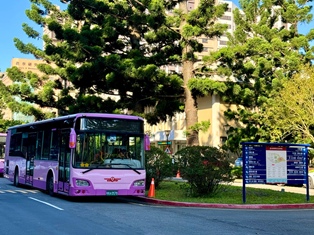
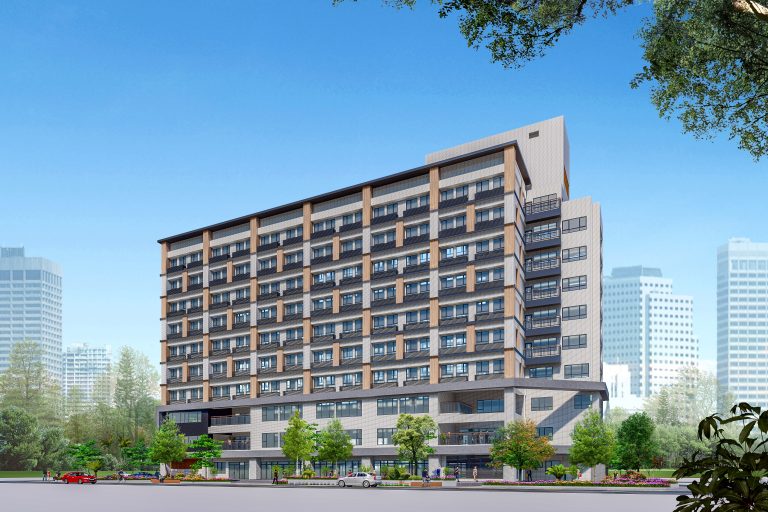
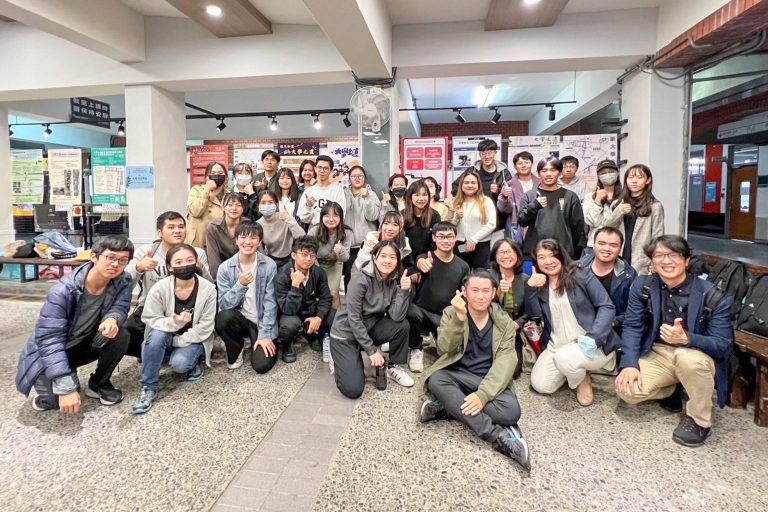
11.4.3 Allowing Remote Work
To balance official duties with employees’ commuting needs and implement computerized attendance management, the university has established the “Flexible Working Hours Management Guidelines.” The flexible commuting hours are from 7:30-8:30 AM to 4:30-5:30 PM. Additionally, the university approved a remote work policy and procedures in response to the pandemic and to maintain stable campus operations (available on the Personnel Office’s pandemic prevention webpage). Under the “National Taiwan Normal University Guidelines for Partial Work-from-Home Arrangements,” employees can work remotely. By connecting to the university’s administrative portal via VPN, remote staff can operate the document system online and handle work tasks as usual.
Following the Central Epidemic Command Center’s decision to downgrade the pandemic alert on May 1, 2023, and by health authorities’ policies, the university canceled the work-from-home option starting August 15, 2023. Statistics show that between January 1 and August 15, 2023, 2,204 instances of remote work were recorded.
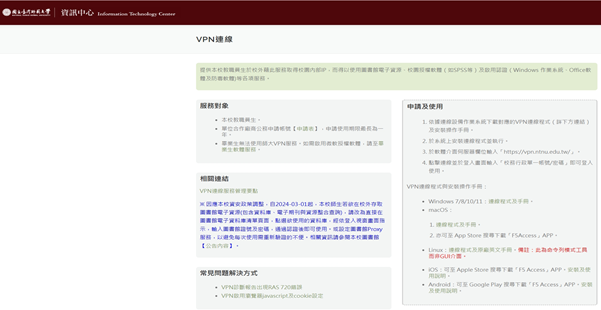
11.4.4 Provision of Employee Accommodation
The university is located in the metropolitan center, with relatively high rental costs. The university provides accommodations to allow faculty and staff to live closer to the workplace, reducing commuting time and housing expenses. It has established the “National Taiwan Normal University Guidelines for Staff Dormitory Use and Management.” The dormitories have basic amenities, including sofas, wardrobes, air conditioners, and televisions. Eligible applicants include:
- Faculty and staff officially employed by the university.
- Visiting faculty, postdoctoral researchers, and contract workers who can apply during their contract period if required for work.
- Non-permanent staff hired due to national policies or specific job needs who can only perform their duties with accommodation.
A discounted rent rate is offered at 60% of the market price. The university has 39 single-room dormitories (25 at the main campus and 14 in Linkou) and 15 multi-room dormitories (7 at the main campus and 8 in Linkou). Over the past three years, 61 people have applied, and 53 have moved in, resulting in an occupancy rate of 87%.
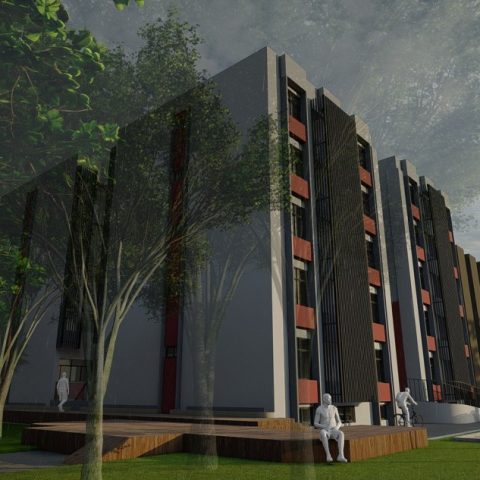
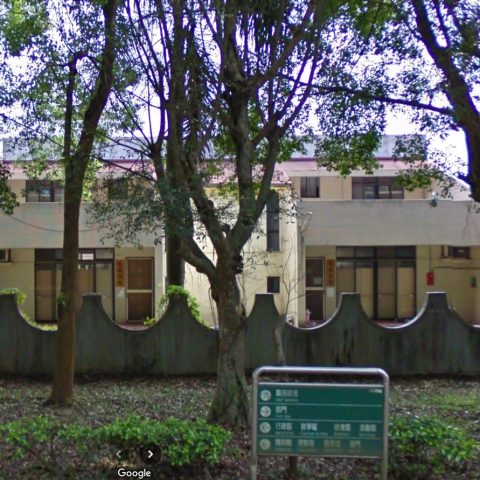
11.4.5 Provision of Student Accommodation
1.The school has established student housing, and a student accommodation committee has been formed by the students of each dormitory.
In recent years, the university has implemented dormitory renovation and reconstruction projects to reduce student commuting pollution and improve the quality of accommodation.
Currently, the university has two dormitory buildings on the main campus (Men’s Dorm 1 and Women’s Dorm 1) and three dormitory buildings at the Gongguan campus (Men’s Dorm 2, Women’s Dorm 2, and Dorm 7), offering various room types, including six-person shared rooms, four-person shared rooms, three-person shared rooms, double suites, and accessible dormitories, providing approximately 6,456 beds. Starting from the 2022 academic year, accommodation fees have been adjusted in line with the number of school weeks and based on the principle of maintaining operational costs. For a six-person room, the lowest rent is approximately NT$1,322 per month.
To assist underprivileged students, the university provides guidelines for discounted housing. Students from low- and middle-income families are given priority for dormitory applications, and housing fees are entirely waived for low-income students. Students facing financial difficulties can apply for deferred payment of accommodation fees or consult the Student Affairs Office for scholarships, financial aid, or emergency assistance based on their circumstances. In 2023, 7,114 students applied for dormitory accommodation, with a dormitory allocation rate of 91%.

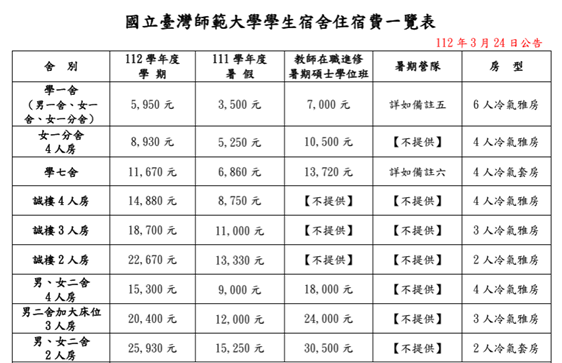
2.To assist international students from around the world with accommodation, our university began construction on an international student dormitory in 2023. Upon completion, it is expected to provide an additional 300 beds.
3.In 2020, the university became the first in Taiwan to introduce gender-friendly dormitories. To encourage respect for diversity, create a welcoming environment, and promote messages of gender inclusivity and anti-discrimination, we established the “National Taiwan Normal University Gender-Friendly Dormitory Guidelines.” 88 beds are available, with the principle of rooming students of the same legal gender. In cases where transgender students apply for dormitory accommodation, the university handles each case individually, without solely relying on biological sex as the determining factor.
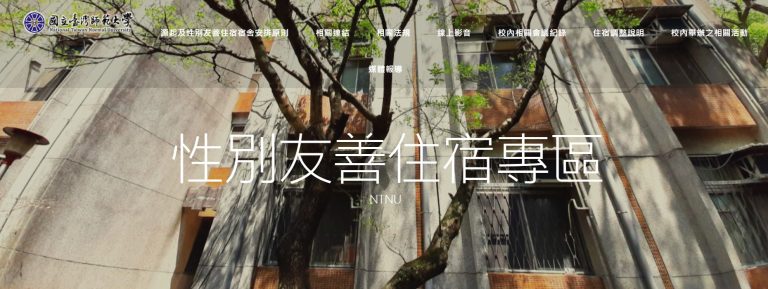
11.4.6 Pedestrian Priority on Campus
The university operates as an open campus, allowing faculty, staff, students, and the general public to access and use campus facilities freely. The “Vehicle and Property Access Management Guidelines” have been established to ensure user safety and maintain campus tranquility. All vehicles entering the campus are subject to management by the relevant university authority. Vehicles entering the main campus must park in the underground parking lot and are not allowed into the campus interior. In contrast, access to other campus areas requires obtaining a temporary permit. Campus planning prioritizes pedestrian safety, with designated pedestrian walkways, covered corridors, and flower-lined paths. Only emergency vehicles for individuals with mobility issues, construction, or official university vehicles are permitted entry.
Campus planning prioritizes pedestrian safety, with designated pedestrian walkways, covered corridors, and flower-lined paths.
parking spaces are provided for those with mobility needs.
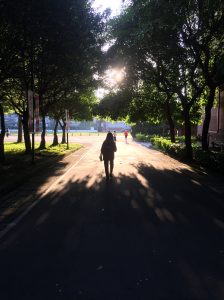
11.4.7 Collaboration with Local Authorities
In order to promote the “National Taiwan University System Alliance” bicycle paths for faculty and students, our school has been advocating for the “University Path Forum” project since 2022, focusing on green energy and low-carbon transportation. This initiative aims to build interactions from the perspectives of industry, government, and academia, facilitating the exchange of knowledge, policies, and practices related to low-carbon green transportation. We have invited Taipei City Council members, the Taipei City Transportation Bureau, community representatives, private engineering companies, and bicycle associations to discuss ways to enhance the University Path. In 2023, the “Interdisciplinary Exploration and Integrated Development Project of the University Path” was launched, consisting of a community formed by various disciplines to implement teaching programs. This project helps students think about various issues and challenges along the commuting routes around the campus, inspiring them to consider green methods that align with “low-carbon, safety, and convenience.” The “University Pathway Project” bike lane, which channels student traffic to nearby businesses, further encourages local businesses to engage in responsible consumption and production, helping contribute to environmental sustainability and advancing our shared commitment to sustainable development.
2.The university is in the heart of a metropolitan area, surrounded by a mix of cultural, residential, and commercial districts with a high population density. Given the relatively high property and housing prices and the noticeable lack of parking spaces, it aims to ease the parking challenges faced by nearby communities and meet local needs. To this end, our HePing Campus parking lot is open to residents for temporary or annual parking (refer to the “Parking Lot Management Guidelines” for details), fostering closer ties with the community.
3.Additionally, through the university’s “SMART Plastic Reduction—A New Era of Hope” University Social Responsibility Program, the university has designated the GuZhuang community, located near the campus, as a demonstration area for plastic reduction. In collaboration with surrounding businesses, we promote responsible consumption patterns.

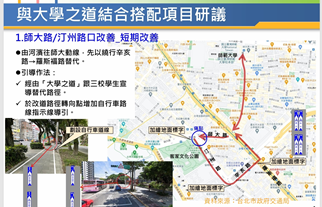
11.4.8 New Building Standards
In alignment with the university’s commitment to sustainable development, all new construction projects on campus incorporate green building practices from the design and planning stages. Upon completion, these projects have successfully obtained Green Building certifications. For instance, the Art Museum and the Multi-Function Activity Center have received Bronze-level Green Building Awards. Additionally, intelligent building technologies were integrated into the design to enhance the Art Museum’s operational efficiency. By meeting the five critical criteria of “structured cabling,” “information and communication,” “system integration,” “facility management,” and “safety and disaster prevention,” the museum was awarded the Smart Building Certificate.
The Cultural and Life Center (International Conference Center) at the Library Campus achieved Silver-level Green Building certification, having met six significant criteria: “greening ratio,” “site water retention,” “daily energy conservation,” “indoor environment,” “water resource management,” and “wastewater and garbage improvement.”
The newly constructed student dormitory at the Gongguan Campus and the Faculty Development Building (No. 26, Lane 77, Sec. 2, Roosevelt Road) were both awarded Green Building Certificates in the “Residential” category.
The International Chinese Language Learning Center’s ongoing construction also follows green building standards for sustainability. It includes accessible suites for individuals with disabilities, inclusive restrooms, YouBike parking spaces, green flowerbeds, and a recreational plaza. These efforts have earned the center a “Candidate Smart Building Certificate” and a “Candidate Green Building Certificate.”
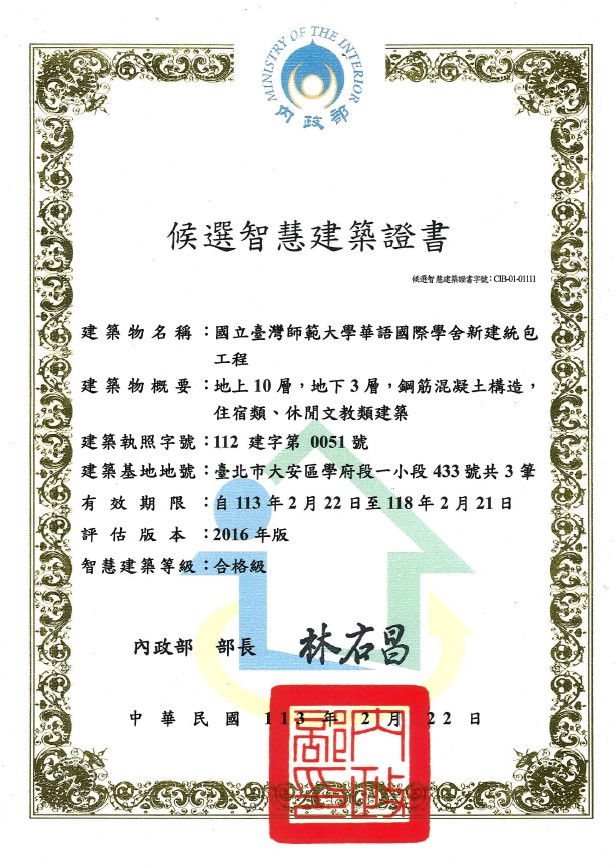
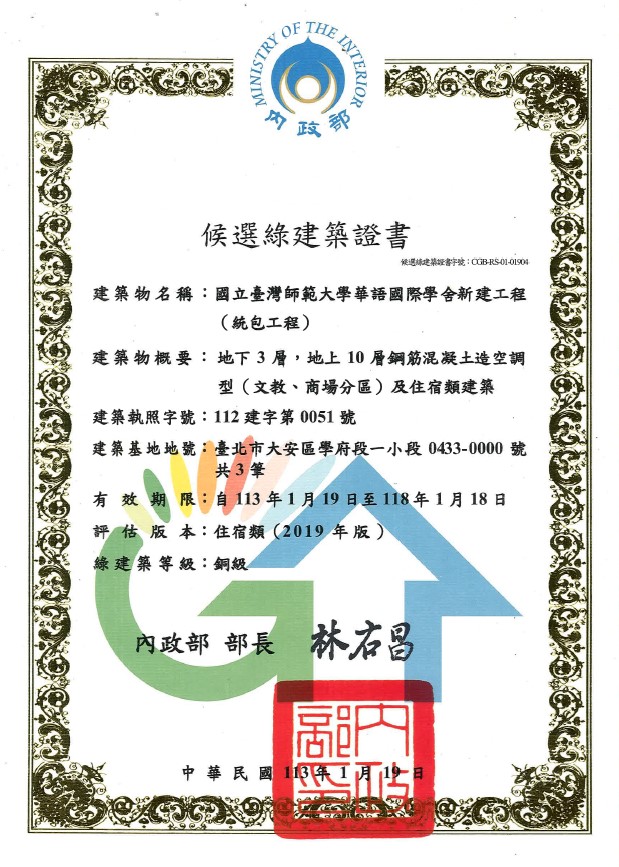
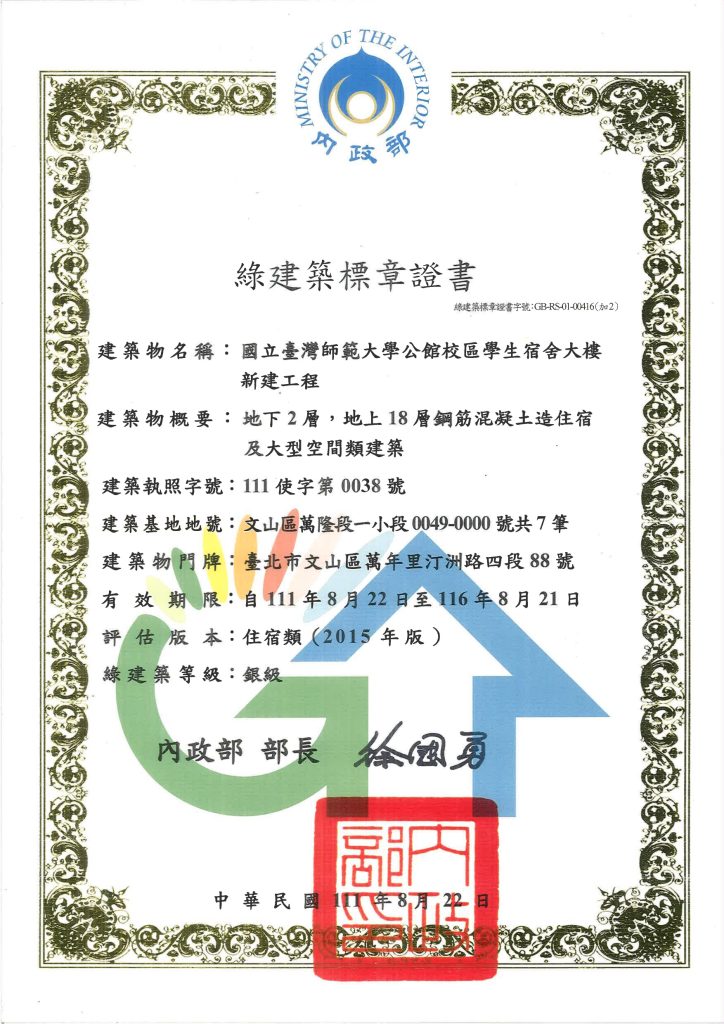
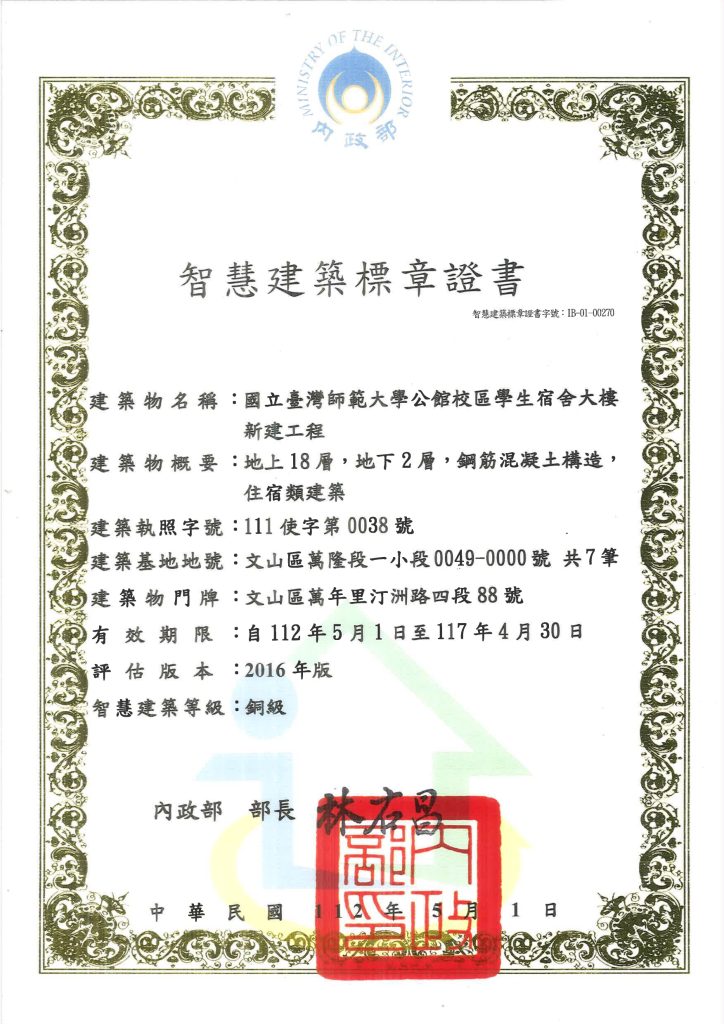
Green Building Certification of Our School
11.4.9 Brownfield Redevelopment
1.The site for the “International Chinese Language Learning Dormitory Project” (a turnkey project) on Wolong Street (Daan District, Taipei City, Section 1, Lots 433, 443, and 444) was initially used as a parking lot. To support the mission of promoting Chinese language and literature education and address international students’ short-term housing needs, a new dormitory building with 3 underground floors and 10 above-ground floors is being constructed.
2.The “Fuzhou Street No. 11 Japanese-Style Dormitory” was the former residence of President Liu Zhen of our university. This wood-constructed building, a blend of Japanese and Western architectural styles from the Japanese colonial period, is one of the rare two-story Japanese-style houses in Taipei and holds significant architectural value. It was designated a municipal historic site in 2011. The “2024 Restoration Project for the Fuzhou Street No. 11 Japanese-Style Dormitory,” a restoration initiative for this municipal landmark site, is scheduled to begin in August 2024 and is expected to be completed by September 2024.
